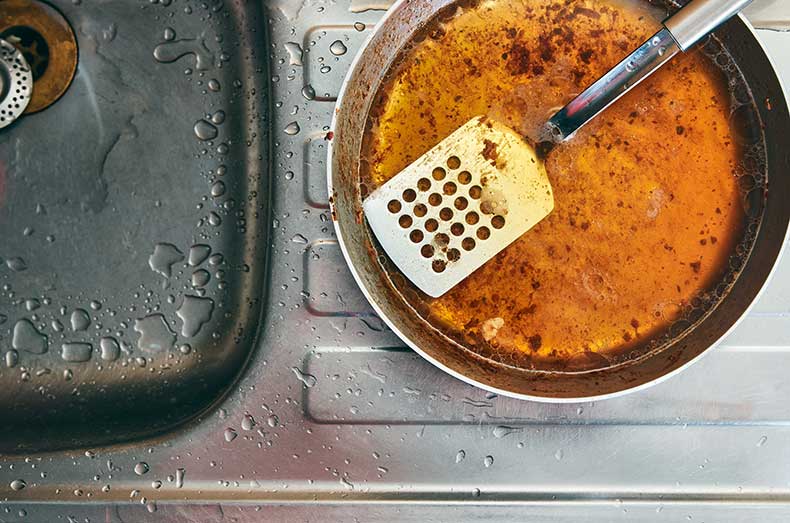Grease in any form is something that should never go down your drains. In many homes, a little grease getting into the drains is unavoidable. Nevertheless, you should never purposefully pour grease down a drain for any reason, and here’s why.
What Happens When Grease Goes Down Your Drain?
Because grease is a liquid when it’s still hot, many people assume that pouring it down the drain is okay to do. However, grease doesn’t stay in liquid forever. Once the temperature of grease drops, it starts to solidify. That solid, sticky mass will sit in your drains and bind everything else to it, including more grease. In no time at all, you’ll have a clog. The clogged drain will only grow and become more of a problem for you.
In addition, even if the grease makes it out of your sewer system, it can become a problem for septic systems and municipal sewer systems. Its ability to solidify and create large clogs only grows in a larger system.
Entire neighborhood sewer systems can fall victim to this process, so you absolutely don’t want to be part of that problem. Instead, practice due diligence when dealing with greases and oils in your home.
What Can You Do to Prevent Grease Going Down Your Drain?
Grease comes in many forms. The leftover cooking grease in your pan represents just one type of grease that shouldn’t go into your drains. Cooking oil, butter, bacon grease, lard, and other greases or fats should be kept away from your drain too.
Instead, dispose of small amounts of grease in the garbage, collect it in a container or can, or reuse it. If you’re dealing with large amounts of grease, you may need to contact a recycling center that specializes in grease and oil collection.
Outside of commercial kitchens and hotels, you’ll likely find it’s okay to simply collect the grease in a jar and dispose of it like any other garbage. If you don’t plan to reuse the grease, then you can store multiple types of grease and oil in the same container until it’s full before tossing it away.
What Can You Do If You Already Have a Greasy Clog?
A clog resulting from greasy buildup can still happen even if you’re careful. You can try pouring boiling water and dish soap into the drain to help loosen and flush the grease. While this may help, it’s not a guarantee that you’re free of the problem. It won’t clear all grease clogs from your lines and will just flush it into your septic tank or the larger municipal sewer system, where it is still a problem.
The best solution is to avoid pouring grease down the drain in the first place. Beyond that, you should have your plumbing system inspected and cleaned by a professional plumbing service. As always, if you’re experiencing signs of a clog or plumbing problem of any sort, call an expert plumbing service to come take a look, before a small clog becomes a big problem.
